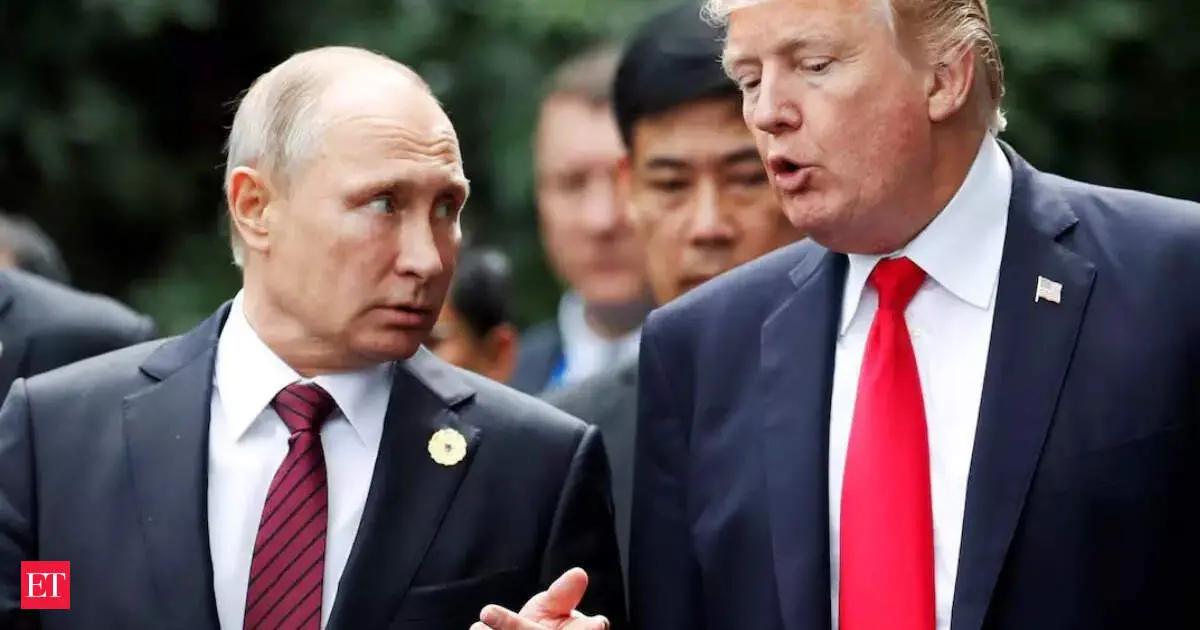Washington, D.C.: In a tense cabinet meeting, U.S. President Donald Trump warned of potential severe economic repercussions for Russia if President Vladimir Putin fails to engage in peace talks with Ukrainian President Volodymyr Zelenskiy. As the conflict continues to take a heavy human toll, Trump reiterated his commitment to imposing significant sanctions aimed at alleviating the war’s impact. However, despite calls for dialogue, no meeting between the two leaders has been set, complicating efforts for resolution.
Trump’s Stance on Economic Punishment
During a recent meeting at the White House, President Trump emphasized the urgency of addressing the ongoing war in Ukraine. He stated, “It will not be a world war, but it’ll be an economic war, and an economic war is going to be bad. It’s going to be bad for Russia, and I don’t want that.” This declaration highlights the escalating tensions as the conflict continues, resulting in a tragic human toll that claims thousands of lives weekly. Trump’s warning signifies a readiness to take swift economic action should Russia not engage in peace dialogue, reminiscent of the broader international measures that often accompany political strife.
Trump’s warning comes in the context of a long-standing commitment to end the war, a promise he made as he took office. Despite a high-profile summit with Putin in August that was expected to pave the way for constructive dialogue, the lack of a follow-up meeting illustrates the challenges in diplomatic efforts. Putin’s reluctance, highlighted by Foreign Minister Sergei Lavrov’s blunt rejection of plans for a summit, shows that the path to peace remains fraught with complications.
Impact on Global Trade: Consequences for India
The implications of Trump’s foreign policy extend beyond Russia and Ukraine. Indian exporters are currently facing one of the toughest trade environments in years, especially following the imposition of a hefty 50% tariff on key goods imported from India by the United States. This drastic measure adds a further 25% tariff to the existing duties and underscores the challenges New Delhi faces in navigating U.S.-Russian relations amidst a heated geopolitical conflict.
For Indian businesses, this is a significant setback. Companies reliant on exports are feeling the strain as tariffs disrupt supply chains and increase costs. For instance, small manufacturers that export textiles might find themselves squeezed between rising production costs and reduced demand in the U.S. market. Anecdotal evidence suggests that some exporters are considering diversifying their markets to mitigate risks, while others are calling for government intervention to protect local industries.
Continued Tensions: Sanctions and Trade Relations
Trump’s administration is not only targeting Russia but also expressing concerns over nations that continue to purchase Russian oil, thereby financing the war. Reports indicate that while the U.S. has appeared to double down on sanctions against India, it has yet to extend similar measures to countries like China, which also maintains ties with Russia. This selective approach raises questions about the long-term implications of the U.S. stance on global trade dynamics.
The frustration felt by the Trump administration is palpable, particularly as Russian aggression in Ukraine persists. Sometimes, attacks occur immediately following diplomatic calls between Trump and Putin, causing concern and disappointment in Washington. Trump noted, “Zelenskiy’s not exactly innocent either,” which underscores the complex relationship between the U.S., Ukraine, and Russia.
Prospects for Peace Talks
Despite the turmoil, Trump remains open to finding a resolution. He recently floated the idea of a peace summit after engaging in discussions with both Zelenskiy and European leaders about security guarantees that would underpin any eventual peace deal. Zelenskiy has indicated plans to present these guarantees soon, facilitated by the backing of the U.S. and its European partners.
Yet the clock is ticking. As the humanitarian crisis deepens, the international community watches closely, hoping for a breakthrough. The absence of a direct meeting between Putin and Zelenskiy continues to cast a shadow over any potential progress. As such discussions remain theoretical at best, many are left wondering what it will take to bring both sides to the negotiating table.
In conclusion, as President Trump conveys his concerns about the economic ramifications for Russia, the broader implications for countries like India further complicate the global landscape. The ongoing conflict not only affects immediate stakeholders in Ukraine and Russia but reverberates across international trade and diplomatic relations, leaving many unanswered questions about the future of peace in the region and economic stability worldwide.
Bankerpedia’s Insight💡
The potential for intensified economic sanctions on Russia could destabilize global markets, impacting not only Russia but also countries like India, which relies heavily on oil imports. The compounded 50% tariffs on Indian goods threaten to disrupt trade dynamics and strain India’s banking and finance sectors. For businesses and consumers alike, it’s crucial to stay informed about these developments and consider diversifying supply chains or energy sources. Proactive measures can help mitigate risks in this uncertain economic landscape, fostering resilience amidst global tensions.
What Does This Mean for Me?🤔
- Salaried Person → Economic instability may impact job security and income.
- Business Owner → Increased tariffs may raise costs and affect profits.
- Student → Increased economic instability may affect student budgets.
- Self-employed → Economic uncertainty and potential sanctions could harm income stability.
- Homemaker → Economic instability may increase living costs for families.
- Retiree / Senior Citizen → Economic instability may affect retirees’ financial security.
- Job Seeker → Increased economic instability affecting job market prospects.
- Farmer / Rural Citizen → Economic instability may affect agricultural pricing and exports.
Research References📚
- economictimes.indiatimes.com
- RBI
- SEBI
- Ministry of Finance
- NABARD
- Department of Financial Services (DFS)
📲 Stay ahead in banking & finance!
Join the Bankerpedia WhatsApp Channel for instant updates, and
subscribe to our YouTube Channel for in-depth analysis and expert explainers.










